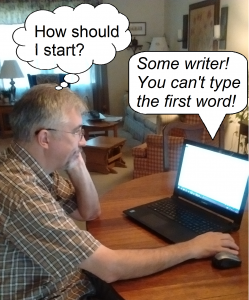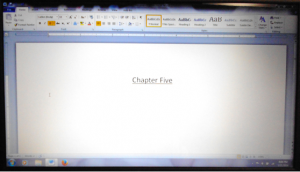There before you glows that blank word processor screen. It’s staring back at you, mocking you. It’s daring you to type something, but you don’t know how to begin. It’s so intimidating.
 You’ve been thinking about your story a long time, plotting it, developing the characters, working on the setting. You have notes, outlines, plot diagrams, and character descriptions up to here. Now it’s time to write, but no words are coming out.
You’ve been thinking about your story a long time, plotting it, developing the characters, working on the setting. You have notes, outlines, plot diagrams, and character descriptions up to here. Now it’s time to write, but no words are coming out.
Friend, you’ve surfed to the right blog post. I’ll get you through this. Most likely, you’re suffering from one of six conditions making it difficult to start. For each condition, I’ll suggest a remedy.
Condition 1: You’re so comfortable with planning your story that the idea of actually writing it paralyzes you. Remedy: Start writing an email to your Mom, or someone else with whom you correspond informally. Write: “Dear Mom, An odd thing happened today.” Then start writing your story. After all, it’s just an email to your Mom…or is it?
Condition 2: You’re looking for excuses to avoid writing. Remedy: Turn off, shut out, and eliminate all distractions. Then take five minutes to immerse yourself in your story notes again…regain the enthusiasm you had when this story was just a glorious notion in your mind. Then let words flow.
Condition 3: You’re afraid your writing will stink, that your first words will be so awful they’ll confirm your suspicions that you’re no writer. Remedy: You may have a misconception about first drafts. Trust me: your final story will look nothing like the first draft you’re about to write.
Condition 4: You believe, if the first words are this tough to write, the rest of the story will take forever. Remedy: Actually, the first ones are the most difficult. Beginning any task is the hard part. Lao Tzu said, “A journey of a thousand miles begins with the first step.” Accept this, and take that first step.
Condition 5: You’re afraid the hook (the beginning of the story) won’t seize the reader’s attention. You’re so worried about this that you can’t start. Remedy: Start writing a different section of the story. Come back to the hook later. You might even find that the “later” place you started is the real hook.
Condition 6: You believe you must write the hook first, and can’t imagine a way to entice the reader. Remedy: Okay, if you really must start with the hook, start by writing a bad one. Then write twenty alternate versions, trying diverse ideas and different ways to grab the reader’s attention. If none of those are any good, keep writing hook variants until you have one you like; you’ll know the one when you write it.
I’m confident one or more of these remedies will help you. When you successfully begin typing, take a moment to laugh in triumph at the once-blank screen that stymied you moments ago. You can tell it you won; you conquered it, with a little help from—
Poseidon’s Scribe

